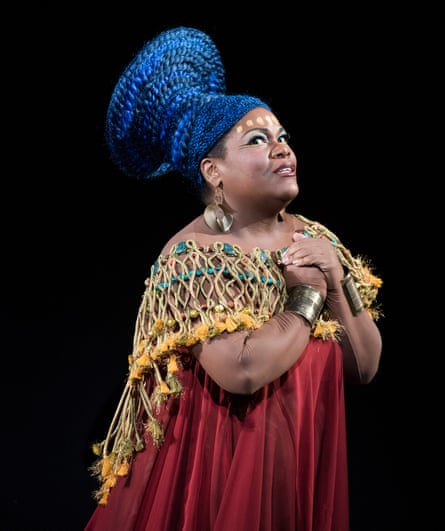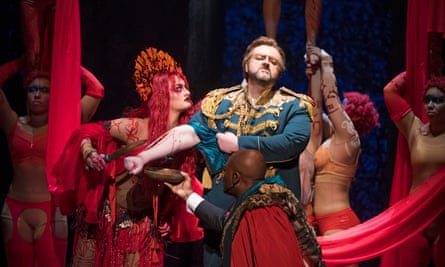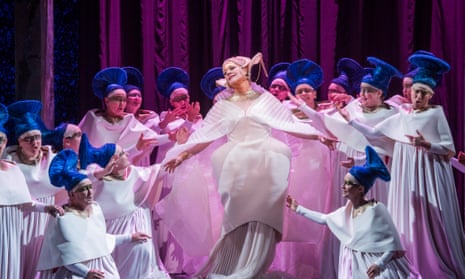Keri-Lynn Wilson got a rapturous cheer before she had so much as twitched her baton on the first night of Aida – partly because it is still a rarity to see a woman lead an orchestra. But that pleasure aside, she can be cheered for all the right reasons too: she leads the first-rate orchestra with verve. Musically, this was a satisfactory evening – if you had closed your eyes throughout, blamelessly good. Theatrically, I am still puzzling over it (ironically, it was its “theatricality” that Verdi himself most prized about his opera). It begins promisingly: the heavy blue curtain opens with exaggerated slowness, like a striptease, to reveal a slim obelisk of orange light. Gwyn Hughes Jones as Radamès sings superbly, in an all-conquering voice, with enough honey in it for any love song, and you hear, disarmingly, his Welsh accent leaking through. But as he sings about Aida “radiant with light”, a length of billowing turquoise undulates, like a silken monster, as a baffling illustration to his text. It is the beginning of an evening of inexplicable visual outlandishness.

Michelle DeYoung as Amneris, the king’s daughter, is dressed in a white costume that makes her look like a badly wrapped parcel with lots of escaping paper. And how could anyone be taken seriously wearing such an odd bonnet? It does not seem a fair way to dress a fine singer. Sack the milliner, I found myself scribbling on my notepad, in the dark, as the parade of hats continued and their peculiarity intensified. Aida, in a more pardonable attempt at Egyptian accuracy, wears what looks like a blue bollard – you could tie a ship to her head. There is also a surfeit of other attention-seeking headgear: antlers, ravens’ wings, papier-mache animals – this top-heavy Aida could take on Ascot. I love inventive eccentricity but want to feel it is in the service of a story. I did not know why anyone was dressed in this random way. Why is Aida wearing what looks like a fishing net round her neck? I could not make head or tail – but particularly head – of the visual vocabulary; it was a hat trick too far. Phelim McDermott is a beguilingly original director – his recent production of Akhnaten, also set in Egypt, won him an Olivier. It is understandable that he wants to avoid, as he says in a programme interview, looking like the “top floor of Harrods with all that bling”. But where is the dazzle of the desert? What we have, here, in Tom Pye’s design, is darkness, incoherence and obelisks that look like the luminous noses of Edward Lear’s Dong.
Aida is superlatively sung by Latonia Moore. Her voice – pure, powerful, filling the house – has a life of its own and that, it will turn out, is what it needs because something has gone awry with the acting here, almost across the board. The programme’s account of the rehearsal process sounds invigorating – a departure from tired tradition – but, in practice, I did not believe a word anyone was singing, with the exception of Musa Ngqungwana’s Amonasro, Aida’s father, who looks his daughter in the eye, the depth of his rapport a contrast to dimensionlessness elsewhere. One of the challenges of directing opera is to keep the interconnectedness even when – or especially when – a singer is addressing the audience exclusively. Here, too often, the character being sung to hangs about like a wallflower. This lack of connection between characters is a disaster. And there is no shortage of other minor details that need a rethink. One example: in the final scene, Radamès, about to be buried alive, hears noises and wonders who is coming. He has, in this production, barely finished his question before Aida is upon him, which makes his doubt about who was disturbing the peace seem absurd. A laboured English translation does no one any favours either. When Amneris sings: “I loved you. I suffered torture,” it sounds translated. Cloaked in Italian, it might have moved us to tears. Aida is described as a love triangle – here, with an over-reliance on the audience as its over-addressed fourth side, it is a lifeless square.


Comments (…)
Sign in or create your Guardian account to join the discussion